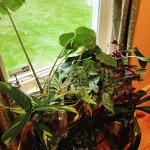Have you noticed this phenomenon this season? Pamm Cooper discussed it in the Hartford Courant this past weekend!
Check out that fall color! 🍂
Eastern redbuds (Cercis canadensis) are members of the bean and legume family, Fabaceae. The tree pictured is identified as C. canadensis ‘Forest Pansy’ on UConn’s Campus Tree Map. Eastern redbuds of this cultivar display leaves with hues of red and ...purple in the fall. In the spring, flowers reminiscent of those seen on peas bloom before leaves emerge, popping up on bare branches in early spring. Subsequently, dry seedpods are produced after flowers and remain on trees into winter.
📸s by Emily Leahy, UConn Plant Diagnostic Lab
#redbud #cerciscanadensisforestpansy #cerciscanadensis #landscapetree #specimentree #planthighlight #uconnstorrs #uconnarboretum #fallcolors #uconnladybug
Happy World Food Day! 🥕🍅🌽
Gardening not only boosts mental and physical well-being, but also supports a more sustainable future and promotes food security in your home and community.
The UConn Home & Garden Education Center is here to support local gardeners with ...expert advice, educational resources, and sustainable gardening practices that help you grow fresh, healthy food right in your backyard.
Whether you're just starting out or expanding your garden, remember that we're here to help you succeed!
📸 by Heather Zidack, UConn Home & Garden Education Center
#WorldFoodDay #GrowYourOwnFood #SustainableGardening #GardenSupport #FoodSecurity #UConnExtension #UConnLadybug
Pearl crescents (Phyciodes tharos) and other butterflies, including migrators, use any available nectar sources in early fall.
Native asters are abundant this year and supply necessary food for our butterflies and bees. In the second image, the Confusing bumblebee (Bombus perplexus) is on ...a native New England aster in a field.
Learn more about native asters in our October Newsletter! https://homegarden.cahnr.uconn.edu/2025/10/03/october_news/
The fifth biennial UConn Native Plants and Pollinators conference will be held Thursday, November 13, 2025, from 8:45 a.m.-3:15 pm, at the UConn Student Union Ballroom (Room 330), 2100 Hillside Road, Storrs, CT.
Register for an exciting day of presentations featuring current science-based... research and information on supporting pollinators in managed landscapes. Learn how native plants support pollinator health throughout the year! This program is designed for growers and other green industry professionals, landscape service providers, landscape architects and designers, town commissions, municipalities, and home gardeners.

November 13, 2025 Student Union Ballroom (Room 330) 2100 Hillside Road, Storrs, CT 8:45 am - 3:15 pm Register HERE Join us for an exciting day of...
ipm.cahnr.uconn.eduICYMI: Our October Newsletter is out! Catch up on all the latest gardening tips for the month of October including planting garlic, putting your veggie garden to bed, common apple ailments and more! Check it out at the link in our bio.
#newsletter #enewsletter #gardentips #gardenadvice ...#fallgarden #october #garlic #apples #uconnladybug
Pearl crescents (Phyciodes tharos) and other butterflies, including migrators, use any available nectar sources in early fall.
Native asters are abundant this year and supply necessary food for our butterflies and bees. In the second image, the Confusing bumblebee (Bombus perplexus) is on ...a native New England aster in a field.
📸s by Pamm Cooper, UConn Home & Garden
Education Center
#pearlcrescent #phyciodestharos #bombusperplexus
#bumblebee #nativeplants #newenglandaster
#newenglandasters #uconnladybug
Catch up on all the latest gardening tips for the month of October including planting garlic, putting your veggie garden to bed, common apple ailments and more!

“October is the month for painted leaves.... As fruits and leaves and the day itself acquire a bright tint just before they fall, so the year near...
homegarden.cahnr.uconn.edu




